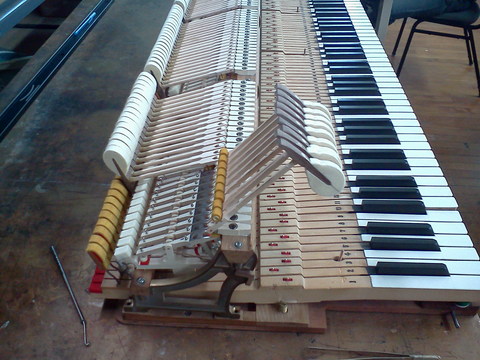PIANO REGULATION
Regulation involves adjusting the mechanical aspects of the piano.
Why is regulation important?
In a well-regulated piano, each note feels the same to the pianist's touch, the dynamic range is maximized, and the keys are responsive to the most subtle command of the pianist. In other words, the pianist has perfect control and maximum power.
A poorly-regulated piano will make it difficult for the beginning piano student to make progress and will be much less enjoyable to play. The pianist simply cannot compensate for poor-regulation by more practice.
Why do pianos go out of regulation?
A piano's action is composed of several thousand moving and stationary parts. Traditionally, these are made of wood, metal, wool, leather. Over time, the materials compact and settle. Wood and wool are also subject to dimensional changes due to humidity. They swell in humid weather and contract in dry weather. These changes affect the piano's action. The touch becomes inconsistent, the keys are less responsive and the dynamic range is limited.
Regulation involves adjusting the mechanical aspects of the piano.
Why is regulation important?
In a well-regulated piano, each note feels the same to the pianist's touch, the dynamic range is maximized, and the keys are responsive to the most subtle command of the pianist. In other words, the pianist has perfect control and maximum power.
A poorly-regulated piano will make it difficult for the beginning piano student to make progress and will be much less enjoyable to play. The pianist simply cannot compensate for poor-regulation by more practice.
Why do pianos go out of regulation?
A piano's action is composed of several thousand moving and stationary parts. Traditionally, these are made of wood, metal, wool, leather. Over time, the materials compact and settle. Wood and wool are also subject to dimensional changes due to humidity. They swell in humid weather and contract in dry weather. These changes affect the piano's action. The touch becomes inconsistent, the keys are less responsive and the dynamic range is limited.
Regulation




